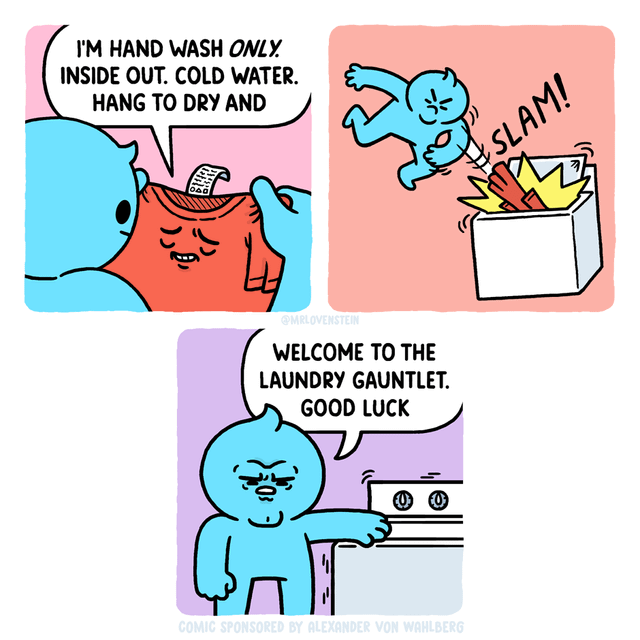I usually make 3 piles of laundry to wash according to color and not fabric: black clothes go in one pile, every other clothe I own goes into a second pile (colors white to navy blue). The third pile is for my bed linens and towels, (100% cotton, so I can wash them to 140°F)
Now, I don’t know if I should make more piles instead, because my bed linens and clothes sometimes combine several colors and I don’t know if they bleed and I’m slowly degrading them:
I was thinking of making a pile for black clothes, one for white clothes, one for every other color clothe I own (I have purple, yellow and green stuff plus denims), one for my bed linens (all of them are mixed colors, including dark and clear colors like red, orange, green and black in one piece) and another pile for my towels (one color only, but different ones, including green, purple, white, yellow and navy blue).
Regarding fabrics, I have 100% cotton, 100% merino wool, 100% polyester and mixed fabrics, so the number of piles can grow considerably.
I live alone, so sometimes I can need a lot of time to get a laundry worth pile of stuff to wash if I create as many piles as I suggested here.
I may be overthinking it but I’d like to do the laundry the right way and keep the stuff I already have in good condition. How do you do it?
Basically this

You’re overthinking it.
Modern fabric dyes are a lot better than 40 years ago. Like, don’t wash something dark the first time with a bunch of white stuff, but after the first wash or two it definitely doesn’t matter
Cheap clothes bleed a lot. Specially synthetics. It’s horrible honestly.
Like what cheap are we talking about here? Ordering from overseas?
Walmart or other cheap places are perfectly fine.
Are you washing in hot water? My clothes are far from expensive but I’ve never had that issue. I wash in cold water though which apparently doesn’t have the issue so much
And on the other side of the equation, modern detergents are way better and being colorfast.
I don’t.
And haven’t for 30+ years. I also wash everything on cold (my cold water is about 65°), and use the shortest cycle.
Minimal drying time at low temp.
The only time I separate is when there’s something new - that will get washed once by itself or with like colors to ensure the dye is set. And I avoid washing reds with whites.
I don’t
Yeah if it doesn’t survive the gauntlet then it’s not meant to be. For like suits, coats, and other things that probably shouldn’t be washed I’ll send them to the cleaners.
Generally, after two or three washes, you don’t need to separate any more. You really only get bleeding with new fabrics, and even then only with cheap fabrics. As an example, if you order Amazon’s cheapest towels, not only wash them separately, wash them before you use them unless you want the color on you. But even those eventually stop bleeding.
If you’re going to sort, the way I was taught is to separate colors from whites, with blacks being a separate load as well. The idea is that the bleed from any of the colors isn’t going to be enough to matter since there’s already dye present, which means there’s less ability to take on new dye. That can fail, and you end up with the color of things changed. So you still always test any new fabrics before throwing them in with other colors. But, generally speaking, if you don’t have the time, don’t have enough of that color to make a load, or just don’t care about color change, the risk of any color change being huge is low nowadays.
The only reason to do blacks on their own is that it mutes other colors when it bleeds.
If you’re really paranoid about it, either do each color on their own, or make batches where the colors bleeding wont be as significant. Like, blues and greens, or greens and yellows. Any bleed that does happen like that won’t be as noticeable, if it is at all.
But I never saw in all my years washing other people’s clothes anyone that had enough of every color to make multiple loads without waiting way too long between washings. Maybe in a really big family you’d pile up enough mixed colors in a week or two to make full loads of multiple single colors, or even two colors.
You’re also usually okay washing bed sheets and clothes together, though you can pull out stuff with zippers and metal buttons if you take want to maximize life spans of the rest. Being real though, making a load of those together is just going to shift which items get the teeny, tiny extra bit of wear from the fasteners. It might be worth it with heavy denim, but I wouldn’t and don’t bother personally.
Now, as far as types of fabric, you run into some issues. Good wool might need its own special care, but you’d want to refer to the label to determine that. Silk is hand wash only unless you like ruining silk. Cotton, linen, polyester, rayon, and nylon can all be washed with any other fabrics, no issues. At worst, you might run into a little extra pilling with the natural fabrics being washed together, but I’ve sever seen it actually happen more than what the fabrics do on their own just from being washed.
You specified merino wool. Afaik, you should machine wash as the default. But wash in cold only, and go with the bare minimum of detergent. Make sure you pull it out as soon as possible to reduce wrinkling, and hang to dry. Yeah, in theory your can machine dry merino, but if you’re asking this at all, you want to maximize the life and appearance of your clothes, so hang to dry.
Hand washing works as well as you’re willing to put in the work on, but wool tends to hold on to oils and sweat residue more than most fabrics, so you have to really work at it compared to something like cotton that gives up oils as easily as any natural fabric will.
If you’re having a problem with lint on your laundry, do your towels and other terry fabrics on their own. Most of the time, that’s where excessive lint is coming from. But if you aren’t having that issue, don’t worry about it.
A lot of separating of types of fabric goods, like sheets from clothes, isn’t about what they’ll do to each other or needing different types of care, it’s about convenience. Folding and storing sheets all at once is easier than dealing with a mixed load, as an example. You do benefit in being able to run things like towels hotter than you’d want with most clothing, but it’s a marginal benefit imo.
My laundry isn’t sorted much at all unless I get new stuff. Towels and washcloths and the like stay in their own loads. Clothes together, with only a few extra heavy fabrics on their own (like my canvas outdoors stuff and gis). Bed linens tend to be a load of their own since there’s two beds worth of those at a time, there’s just not room for more. But, when that’s not the case, I tend to throw them in with towels.
And, as always, check your labels. While it isn’t a guarantee, the recommended care on them really is the best pick. You’ll run into some chinese fabrics where it’s just generic instructions, but those tend to default to the least wear options anyway, so it won’t hurt anything, it just isn’t ideal. The companies using outsourced labor still specify the label contents, so it’s only when it isn’t a brand at all that you see the generic labels.
I also tend to recommend that you avoid fabric softener. They really don’t do anything useful, they cost extra, and a lot of people are sensitive to them and don’t realize it. If you’re getting itchy a lot, and you’re using them, try a few weeks without. Same with rashes where the fabric is extra close to skin.
i just wear dark clothing
Everything together in cold water
Same.
Slap them all in the washer together and enjoy any new coloured clothes I have.
Most damage comes from heat, and rough handling, so I sort by structure/weight, and wash almost everything on cold, and tumble dry on low, auto-sense.
The only color I wash separate is white so it can run hot and with bleach.
I also presort, by weight into 4 bins heavyweight, middleweight, lightweight/dress-shirts, and finally undergarments/delicates/socks
We might go a 2-3 weeks between a running a particular bin so we can separate things out just because there is enough to fill out it’s own load.
Undergarments and deli sites go together, might add leggings or lightweight tops to fill out a load
Socks are separate merely because we like fluffy wool socks and they will fill their own load, and it’s easier to pair them when they all come out together. Otherwise they’d be with undergarments. Might run on warm if the foot stank is real bad.
Sturdy fabrics like denim and duck all go together in a denim cycle it’s just cold/cold with a heavy spin
Sweats and other heavy bulkys go together so they don’t twist up lighter clothes. Might run these with denim or towels
Lightweight tops and button down shirts go together. Lightweight sweaters might be get mixed in too.
Then general laundry is middleweight fabrics: t-shirts, slacks leggings, etc.
If there’s enough for their own load, towels get a hot cycle to get cut down on microbial growth. Otherwise they go with denim and/or sweats. NEVER USE FABRIC SOFTENER/DRYER SHEETS ON TOWELS. It makes things softer by adding oils THAT prevent them from absorbing water, which is the whole point of towels.
Sheets and pillowcases might get a warm cycle and pre wash to help cut through accumulated body grease, etc.
Undergarments and deli sites go together
Now I’m not allowed back in Subway.
Low heat alone will help a ton like you said, high heat seems to ruin everything and it’s just not needed unless unless it’s towels maybe.
I knew that fabric softener would stop towel absorption but I never thought about dryer sheets too. I thought those were just antistatic.
Also the “deli sites” typo made me laugh.
Easy. I only have black clothes. If there’s bleeding, I can’t see it.
I don’t think I do it correctly tbh, but since I have to drive to the laundromat to do my laundry, and pay out the ass for it ($12 per fucking load!!), all I want is to get in and out of there as fast as humanly possible. So I have two piles, one for all my clothes regardless of color or material, and the other for sheets and towels, regardless of color. I haven’t noticed any colors bleeding or extra degradation, and my clothes generally look pretty undamaged and crisp. I also typically use the hottest cycle for everything, which again, probably isn’t great, but it seems to work for me.
The cost of doing laundry is insane. I started doing mine by hand at home.
$12? I’m glad I was already lying down when I read that. It was only $2 (total) per load when I was in college 15 years ago, and I was already trying to min-max it then. I’d go back to hand washing and line drying if I saw that.
You’re completely overthinking it. I keep white separate. Colors get their own basket. Denim goes in a separate piles after it really smells (it honestly shouldn’t be washed very much). Towels get their own load due to shedding. Sheets sometimes go in with the colors.
I do everything on cold. I use the plainest of plain detergent. If there’s a smell in polyester or nylon clothes I’ll put in some Clorox 2.
Dryer on low or medium until mostly dry. I’ve got a fancy one with a moisture sensor that actually works so I let that determine how long. Usually 25-30 minutes.
Citation: https://www.nytimes.com/wirecutter/reviews/wirecutter-show-podcast-20240821-better-laundry-secret/
I don’t separate colours, only new clothes I put in with towels, sheets or clothes that I wouldn’t care if colour bled.
I never wash with hot water, only warm or cold. Low heat dry and cold water washing is really the best effort-for-performance to get your clothes to last, you can hang dry some of them but I personally can’t be arsed.
I have hot wash for towels and bed stuff. Cold for literally everything else. I’ve never had anything bleed, even new stuff.
I try to wash whites alone, but that’s it, and even then I’m not super strict about it. It helps though that probably 90% of my clothes were thrifted, bleeding is mostly a problem with brand-new fabrics








